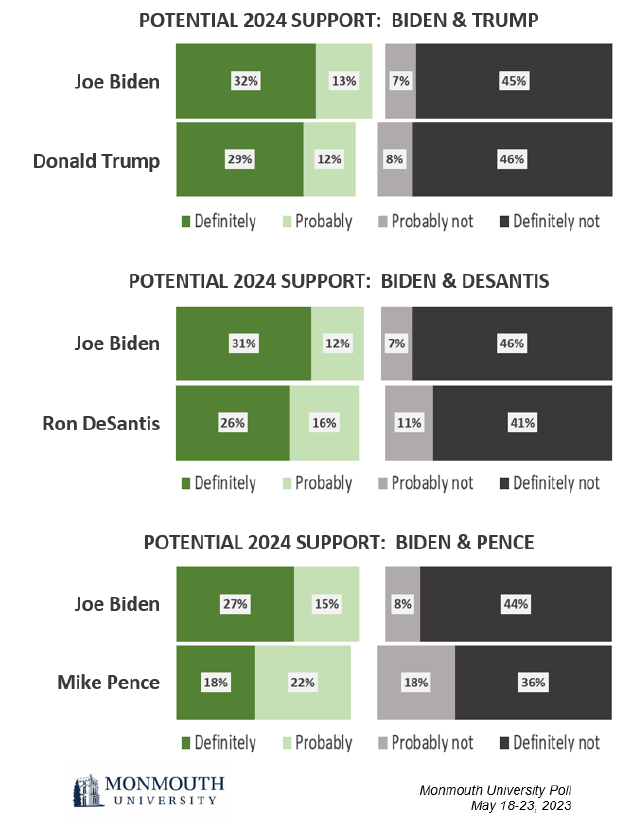West Long Branch, NJ – American voters have a better idea about who they won’t support in the 2024 presidential election than who they will, according to the Monmouth (“Mon-muth”) University Poll. In hypothetical scenarios involving President Joe Biden running as the Democratic nominee against three different Republicans, just under half the electorate says they have definitely ruled out supporting the incumbent. This is nearly identical to the number who have ruled out voting for former President Donald Trump, but higher than opposition to either Florida Gov. Ron DeSantis or former Vice President Mike Pence should either of them become the Republican nominee.
In order to assess the potential floor and ceiling of support for different candidates heading into next year’s presidential contest, Monmouth asked voters to assess their likelihood of supporting each party nominee in three different pairings. In each of the these hypothetical scenarios, between 44% and 46% of registered voters say they will definitely not vote for Biden, and between 7% and 8% say they will probably not vote for him.
Looking at potential support for the incumbent against both Trump and DeSantis, just under one-third (31% to 32%) will definitely vote for Biden, and 12% to 13% will probably back him. Against Pence, though, just 27% will definitely commit to Biden and 15% will probably support him.
“Negative opinion can be difficult to shift, and when it does it tends to be in the wrong direction for the candidate. That’s not to say these views won’t change in the next year and a half, but these results are a sign of how few voters are truly up for grabs in our hyper-partisan political environment,” said Patrick Murray, director of the independent Monmouth University Polling Institute.
On the Republican side of the ballot, Trump has similar negatives to Biden in a matchup between the two – 46% will definitely not and 8% will probably not vote for the former president. However, Trump’s positive support is slightly lower than Biden’s – 29% will definitely and 12% will probably vote for him.
DeSantis has slightly lower negatives than either Biden as his Democratic opponent or Trump as the alternative GOP standard-bearer. Among registered voters, 41% say they will definitely rule DeSantis out and 11% will probably not vote for him. But DeSantis also has lower stated support at this stage – 26% will definitely and 16% will probably vote for him.
Pence could be a wild card since voters have less definite commitments either against (36%) or for (18%) him than they do for either Biden or the other two Republicans tested as candidates in the poll. As noted previously, Biden has lower definite support in the Pence nomination scenario than he does against either Trump or DeSantis.

“There’s little point to asking a traditional horse race question now because the options are not real to voters. If you are going to measure a hypothetical situation it seems to make sense to look at both sides of potential support to see where there is, or isn’t, room for movement,” said Murray in explaining Monmouth’s approach to asking about candidate support.
In all three general election scenarios, between 53% and 54% of men definitely rule out voting for Biden. Among women, a clear majority say they would definitely not vote for Trump (54%), but that level of opposition softens if either DeSantis (45%) or Pence (39%) is the Republican nominee. Among Black, Hispanic and Asian voters, half would definitely not vote for Trump (51%) or DeSantis (49%) but only 38% say the same about Pence. Among white voters who do not have a bachelor’s degree, between 54% and 59% definitely rule out voting for Biden in any of these scenarios. Among white college graduates, 57% definitely rule out Trump, 50% say the same about DeSantis, and 46% say the same about Pence.
The Monmouth University Poll was conducted by telephone from May 18 to 23, 2023 with 981 adults in the United States. The question results in this release are based on 907 registered voters and have a margin of error of +/- 5.5 percentage points. The poll was conducted by the Monmouth University Polling Institute in West Long Branch, NJ.
QUESTIONS AND RESULTS
(* Some columns may not add to 100% due to rounding.)
[Q1-9 previously released.]
[Q10-17 held for future release.]
Imagine it is the 2024 presidential election. The Democratic nominee is Joe Biden and the Republican nominee is Donald Trump. In this scenario…
[QUESTIONS 18 & 19 WERE ROTATED]
18.How likely are you to vote for Donald Trump – will you definitely vote for him, probably vote for him, probably not vote for him, or definitely not vote for him?
| Response: | May 2023 |
|---|---|
| Definitely | 29% |
| Probably | 12% |
| Probably not | 8% |
| Definitely not | 46% |
| (VOL) Don’t Know | 4% |
| (n) | (907) |
19.How likely are you to vote for Joe Biden – will you definitely vote for him, probably vote for him, probably not vote for him, or definitely not vote for him?
| Response: | May 2023 |
|---|---|
| Definitely | 32% |
| Probably | 13% |
| Probably not | 7% |
| Definitely not | 45% |
| (VOL) Don’t Know | 3% |
| (n) | (907) |
Now, imagine the Democratic nominee is Joe Biden and the Republican nominee is Ron DeSantis. In this scenario…
[QUESTIONS 20 & 21 WERE ROTATED]
20.How likely are you to vote for Ron DeSantis – will you definitely vote for him, probably vote for him, probably not vote for him, or definitely not vote for him?
| Response: | May 2023 |
|---|---|
| Definitely | 26% |
| Probably | 16% |
| Probably not | 11% |
| Definitely not | 41% |
| (VOL) Don’t Know | 6% |
| (n) | (907) |
21.How likely are you to vote for Joe Biden – will you definitely vote for him, probably vote for him, probably not vote for him, or definitely not vote for him?
| Response: | May 2023 |
|---|---|
| Definitely | 31% |
| Probably | 12% |
| Probably not | 7% |
| Definitely not | 46% |
| (VOL) Don’t Know | 4% |
| (n) | (907) |
Finally, imagine the Democratic nominee is Joe Biden and the Republican nominee is Mike Pence. In this scenario…
[QUESTIONS 22 & 23 WERE ROTATED]
22.How likely are you to vote for Mike Pence – will you definitely vote for him, probably vote for him, probably not vote for him, or definitely not vote for him?
| Response: | May 2023 |
|---|---|
| Definitely | 18% |
| Probably | 22% |
| Probably not | 18% |
| Definitely not | 36% |
| (VOL) Don’t Know | 5% |
| (n) | (907) |
23.How likely are you to vote for Joe Biden – will you definitely vote for him, probably vote for him, probably not vote for him, or definitely not vote for him?
| Response: | May 2023 |
|---|---|
| Definitely | 27% |
| Probably | 15% |
| Probably not | 8% |
| Definitely not | 44% |
| (VOL) Don’t Know | 5% |
| (n) | (907) |
[Q24-37 held for future release.]
Methodology
The Monmouth University Poll was sponsored and conducted by the Monmouth University Polling Institute from May 18 to 23, 2023 with a probability-based national random sample of 981 adults age 18 and older. Interviews were conducted in English, and included 352 live landline telephone interviews, 512 live cell phone interviews, and 117 online surveys via a cell phone text invitation. The results in this poll release are based on a subsample of 907 registered voters. Telephone numbers were selected through a mix of random digit dialing and list-based sampling. Landline respondents were selected with a modified Troldahl-Carter youngest adult household screen. Interviewing services were provided by Braun Research, with sample obtained from Dynata (RDD, n= 669), Aristotle (list, n= 140) and a panel of prior Monmouth poll participants (n= 172). Monmouth is responsible for all aspects of the survey design, data weighting and analysis. The full sample is weighted for region, age, education, gender and race based on US Census information (ACS 2021 one-year survey). For results based on the sample of registered voters, one can say with 95% confidence that the error attributable to sampling has a maximum margin of plus or minus 5.5 percentage points adjusted for sample design effects (1.69). Sampling error can be larger for sub-groups (see table below). In addition to sampling error, one should bear in mind that question wording and practical difficulties in conducting surveys can introduce error or bias into the findings of opinion polls.
DEMOGRAPHICS (weighted) |
| Self-Reported |
| 26% Republican |
| 43% Independent |
| 31% Democrat |
| 49% Male |
| 51% Female |
| 25% 18-34 |
| 34% 35-54 |
| 41% 55+ |
| 63% White |
| 13% Black |
| 17% Hispanic |
| 8% Asian/Other |
| 66% No degree |
| 34% 4 year degree |
Click on pdf file link below for full methodology and crosstabs by key demographic groups.




